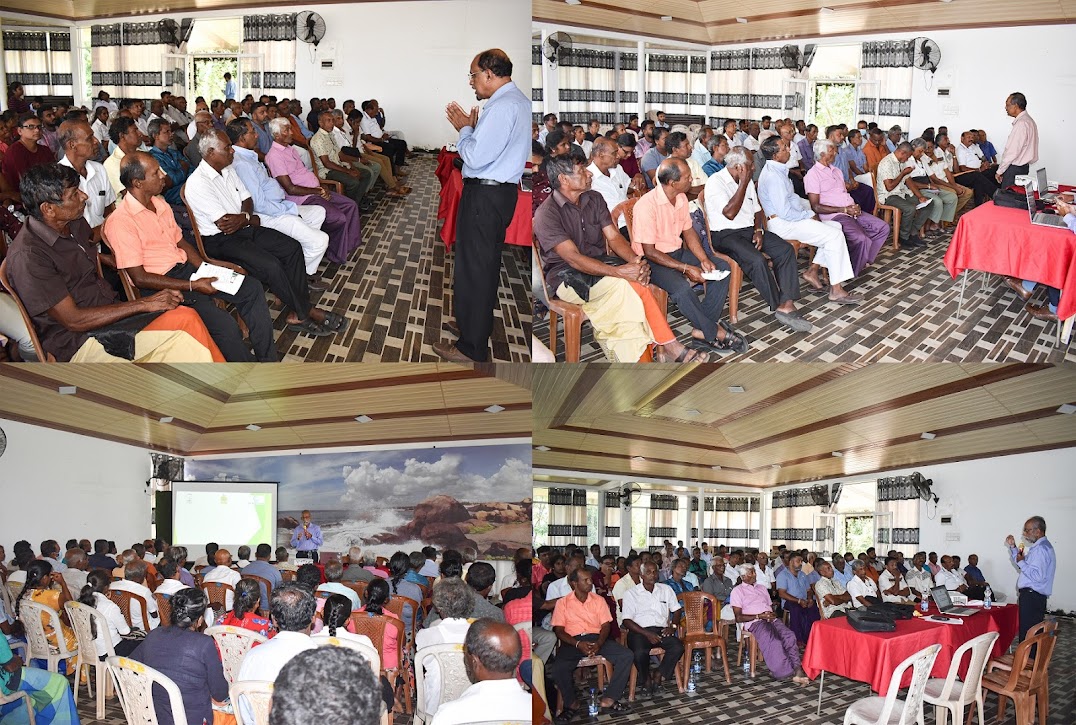The
World Bank Funded Climate Smart Irrigated Agriculture Project (CSIAP) has been
implemented under the Ministry of Agriculture (MoA) in 2019 as a five-year
project to improve the climate resilience of smallholder farming communities
and improve the productivity of irrigated agriculture in 06 Provinces, 11
districts, 52 Agrarian Service Centers (ASCs) Divisions, and 256 Grama
Niladhari Divisions (GNDs) which areas are identified as climatically
vulnerable hotspot areas in Sri Lanka. Climatically vulnerable hotspot areas reveal
that the prolonged draughts, heavy intense rainfall flash floods, variation of
seasonal patterns, strong winds, and rising sea levels have become the main
climate change impacts for the farmers living in hotspot areas.
The CSIAP
is promoting various adaptation strategies to combat the climate change impacts
for project beneficiaries those are:
1.
Promote
Climate Smart Agriculture (CSA) practices and technologies among men and women smallholder
farmers.
2.
Provide
water for agriculture through the rehabilitation of minor tanks, and improve
the cascade development.
3.
Increase
access to the markets by promoting market linkages, post-harvest processing,
value chain development, and providing the machinery for improving the value
chain development activities.
4.
Promote
climate change adaptation and CSA technologies among smallholder farmer beneficiaries
(men and women farmers) through capacity-building and by providing required
agricultural inputs.
CSA
is a quite new concept to the Sri Lankan smallholder farming community, even
though the farmers apply some traditional CSA practices without a real scientific
background. Therefore, there is a critical need to increase and build the
capacities of stallholder men and women farmers for the use of CSA technologies
and practices to fulfil the requirement. In this scenario, an eco-friendly dedicated
CSA Farmer Training School (FTS) was newly built by the CSIAP which opened end
of 2022 in the Thirappane area of the Anuradhapura District. Officials of the
Provincial Deputy Project Directors Offices (PDPDO) are already involved in selecting
the lead farmers through the Farmer Organizations (FO) and Producer Societies
(PS) for the training. Through that, farmers are promoted to build up their
knowledge, and skills on the CSA technologies among both men and women through
the newly built FTS of CSIAP. Once the lead farmers get knowledge of the CSA
technology at the FTS, they go back to their villages and share their knowledge
with the other farmers.
The
men and women farmers are identified by the provincial Deputy Project Director
(DPD) offices to represent all ASC divisions and make necessary arrangements to
transport them to FTS promises on time. 25 lead farmers (14 men and 11 women) are being recruited to each batch
for the 03 days residential training program on CSA practices and technology at
the FTS. Most
importantly, CSIAP is always ensuring the project’s target that is when the
lead farmers are recruited to the CSA training program, at least 40% of the
leaded farmers should be female farmers. Therefore, Women farmers will get the
opportunity to adopt the CSA technologies in climatically vulnerable hotspot
areas.
The project is continually transferring knowledge on CSA technology
to the participants through the FTS. Men and women farmers gain knowledge on
the climate change impacts, mitigation, and adaptation of climate change
impacts, how CSA can help to overcome the adverse impacts of climate change,
sustainable management of the natural and farming landscape, building the
resilience of local ecosystems, adjusting cropping calendar as per weather
forecast, selection of tolerated crop varieties, on-farm water management
technics, building soil resilience through soil fertility management,
protecting crops from climate-induced pest resurgence, and sustainable
intensification of crop production, crop-livestock integration, fodder
protection, and seasonal stocking of freshwater fish in the village tanks,
productivity enhancement through mechanization, the use of market information,
value addition, and marketing for increasing farmer income. Knowledge acquired
from training used for CSIAP interventions, and knowledge disseminated among
fellow members of the community.
CSIAP
is planned to carry out 62 training sessions for leader farmers (both men and
women) and technical officers during the project period and build capacities of
1860 participants on CSA technologies and practices. So
far 08 training conducted at the eco-friendly CSA FTS 184 lead men & women
farmers have participated. Out of that 42% of women farmers were trained in CSA
practices and technology at the FTS.
Table
No: 01 Details of the training program conducted at the dedicated CSA farmer
training school, Thirappane on the CSA Practices and Technologies.
An
Eco-friendly dedicated CSA farmer training school is one of the most important
assets for the farming community in Sri Lanka. Social
inequalities put many people on the frontline of harmful climate change impacts
while constraining their options for taking action to reduce them through
adaptation. Gender is often a defining factor of these barriers to adaptation.
It
is important to say that inclusive and meaningful participation of all
community groups, particularly the most vulnerable is included in the training
programs. Participation in the training program empowers men, women, boys, and
girls to find solutions to their development challenges. Empowering
women and engaging men in a process where women and men work together as
equally recognized decision-makers at the FTS. It is a crucial pathway toward
gender equality and resilience among the smallholder farming community in
climatically vulnerable hotspot areas.
In
addition to the above facts, men and women farmers listen, learn and respect
each other, are trained to be culturally and socially sensitive, prepared to
unlearn negative attitudes and stereotypes, personal cultural/ gender bias,
share their knowledge, experiences, etc. with their community.
Females' participation on training programmes at Framer Training School in Thirappane, Anuradhapura
Written
by Sharmila Thirhiharan, Gender Development Officer, PMU, CSIAP





.jpg)


